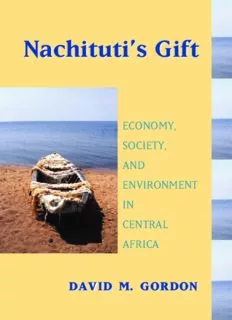
Nachituti's Gift: Economy, Society, and Environment in Central Africa (Africa and the Diaspora) PDF
Preview Nachituti's Gift: Economy, Society, and Environment in Central Africa (Africa and the Diaspora)
(cid:79)(cid:79)(cid:98)(cid:98)(cid:100)(cid:100)(cid:105)(cid:105)(cid:106)(cid:106)(cid:117)(cid:117)(cid:118)(cid:118)(cid:117)(cid:117)(cid:106)(cid:106)(cid:214)(cid:214)(cid:116)(cid:116)(cid:33)(cid:33)(cid:72)(cid:72)(cid:106)(cid:106)(cid:103)(cid:103)(cid:117)(cid:117) (cid:70)(cid:68)(cid:80)(cid:79)(cid:80)(cid:78)(cid:90)(cid:45)(cid:33) (cid:84)(cid:80)(cid:68)(cid:74)(cid:70)(cid:85)(cid:90)(cid:45)(cid:33) (cid:66)(cid:79)(cid:69)(cid:33) (cid:70)(cid:79)(cid:87)(cid:74)(cid:83)(cid:80)(cid:79)(cid:78)(cid:70)(cid:79)(cid:85)(cid:33) (cid:74)(cid:79)(cid:33) (cid:68)(cid:70)(cid:79)(cid:85)(cid:83)(cid:66)(cid:77)(cid:33) (cid:66)(cid:71)(cid:83)(cid:74)(cid:68)(cid:66) (cid:69)(cid:69)(cid:66)(cid:66)(cid:87)(cid:87)(cid:74)(cid:74)(cid:69)(cid:69)(cid:33)(cid:33)(cid:78)(cid:78)(cid:47)(cid:47)(cid:33)(cid:33)(cid:72)(cid:72)(cid:80)(cid:80)(cid:83)(cid:83)(cid:69)(cid:69)(cid:80)(cid:80)(cid:79)(cid:79) nachituti s gift ’ africa and the diaspora History, Politics, Culture series editors Thomas Spear David Henige Michael Schatzberg NACHITUTI’S GIFT ECONOMY, SOCIETY, AND ENVIRONMENT IN CENTRAL AFRICA David M. Gordon the university of wisconsin press The University ofWisconsin Press 1930 Monroe Street Madison, Wisconsin 53711 www.wisc.edu/wisconsinpress/ 3 Henrietta Street London WC2E 8LU, England Copyright © 2006 The Board ofRegents ofthe University ofWisconsin System All rights reserved 1 3 5 4 2 Printed in the United States ofAmerica Library ofCongress Cataloging-in-Publication Data Gordon, David M., 1970– Nachituti’s gift: economy, society, and environment in central Africa / David M. Gordon. p. cm.—(Africa and the diaspora) Includes bibliographical references and index. ISBN 0-299-21360-9 (hardcover: alk. paper)— ISBN 0-299-21364-1 (pbk.: alk. paper) 1. Luapula River Valley (Zambia and Congo)—Social life and customs. 2. Luapula River Valley (Zambia and Congo)—Economic conditions. 3. Luapula River Valley (Zambia and Congo)—Environmental conditions. 4. Fisheries—Economic aspects—Luapula River Valley (Zambia and Congo). 5. Fish trade—Luapula River Valley (Zambia and Congo). 6. Bemba (African people)—Economic conditions. I. Title. II. Series. DT3140.L83G67 2005 968.94—dc22 contents Illustrations vii Preface and Acknowledgments ix Translation and Orthography xiii Introduction: Tenure, Wealth, and Environment 3 part 1: stories of conquest 1 Nachituti’s Gift: The Kazembe Kingdom and Owners of the Land 27 2 The Colonial Net: Chiefs on a Colonial Border 62 3 The Meanings of Wealth: People and Things 86 part 2: the fishery 4 Mpumbu: Colonialism and Conservation 115 5 Pale: States and Patrons 141 6 Chisense: Wealth and Family 170 Conclusion: Tragic Assumptions 199 Appendix 205 Abbreviations 207 Notes 209 Glossary 257 Bibliography 261 Index 291 v illustrations Figures 1 Genealogy of the Kazembes 39 2 Goat Clan Matrilineage and the Kazembes 41 3 Expatriate and African Firms and Outlets in Kasenga, 1932–48 92 4 Purchases of Mpumbu by Union Minière du Haut Katanga from Kasenga, 1945–48 120 Photographs 1 Weirs and Traps on the Luapula 121 2 Removing a Trap from a Weir on the Luapula 122 3 An Ichombo on the Luapula 122 4 Union Minière du Haut Katanga Fish Buyers at Kasenga 123 5 Weirs on Floodplains near Kanakashi Island to Catch Juvenile Pale 147 6 Loading an Ichombo with Goods to Trade for Fish 147 7 Fish Trader with Smoked Juvenile Pale on an Ichombo 148 8 Fresh Fish Trader at Mukwakwa Fishing Camp 149 9 Chisense Fishing Boat 184 10 Distributing the Chisense Catch 185 11 Drying and Processing Chisense 185 12 Rural Traders in Kashikishi Fishing Camp 186 13 Bus with Chisense 186 14 Urban Fish Depot 187 Maps 1 Mweru-Luapula and the Region xiv 2 Mweru-Luapula, 1860s–80s 49 vii viii Illustrations 3 Colonial Mweru-Luapula, 1940s–50s 80 4 Select Fishing Camps and Villages, 1970s–90s 150 preface and acknowledgments When I first arrived in Mweru-Luapula, the fertile floodplains, rivers, andlakesthatformpartof thepoliticalboundarybetweenZambiaand theDemocraticRepublicof Congo(DRC),Iplannedtoinvestigatehow chiefs, businesspeople, and politicians had secured power and profit during the colonial and postcolonial periods. In graduate school, after readingtheworkof scholarslikeJanetMacGaffey,JaneGuyer,andSara Berry,Ihaddecidedtostudyinformalpoliticalandeconomicnetworks that rested on unrecorded or illicit economic activities. It took more thanafewvisitstothefishmarketstochangemymind.Whilebargain- ingovermyeveningmeal,IpracticedmyBembalanguageskillsbyask- ingaboutthefishery.Whocaughtthefish?Whereweredifferentspecies found? How were they caught, processed, and traded? As some of my questionswereanswered,Icametorealizehowcrucialthefisherywas tothesubsistenceandcommercialeconomyof theLuapulaValley—it seemed to be the full-time occupation of nearly one-quarter of those who lived in the densely populated valley and a significant source of rev- enue and food for all. A study of the fishery posed questions key to understanding central Africa’s political economy, most notably how cor- porate groups controlled access to scarce resources and translated this access into forms of wealth. Iwasuncertainaboutthisrealignmentof interests.Apioneerinthe writingof Luapula’shistory,MwelwaC.Musambachime,hadalready written an excellent doctoral dissertation about the rise of the fishery duringthecolonialperiod.Perhapsaninvestigationof afisheryputtoo literalaninterpretationonJean-FrançoisBayart’s“politicsof thebelly”? Yet if, as the popular African saying goes, a goat eats where he is teth- ered,myfoodforthought—andmyfood!—wasLuapula’sfish.Patterns of wealth, patronage, and political power in Luapula revolved around the fishery; fish are to Luapula what cocoa is to parts of West Africa. The questions I had asked about rural elites in the abstract became grounded in the fishery. How had forms of ownership and control in the ix
Description: